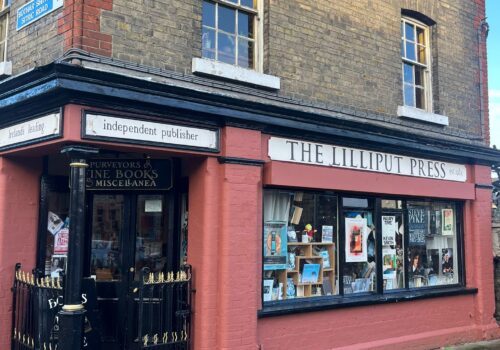Na Séasúir: The pop-up serving up tongues and tripe
Words: Caitriona Devery
Photography: George Voronov
Words: Caitriona Devery
Photography: George Voronov
Farrelly and Michelle Wickham are the two chefs – or possibly cooks, we’ll get to that in a bit – who staged an unusual offal-based pop up called Na Séasúir (the seasons) in Forest Avenue on a Monday in April. Being from Offaly and a lover of puns I thought the verbal shenanigans would
be rolling off my tongue, but I just didn’t have the heart for it, in the (tail) end. My attempts were all tripe.
Unlike my puns however, the pop up was a success. Two seatings, at 6.30pm and 9.15pm, and the unexpected arrival of an additional 15 guests due to a booking mix-up, gave the two chefs a challenging service.
We didn’t have a written menu but each dish was explained by servers Renata and Todd, who gave the impression they had worked at Forest Avenue for years. We sat down to start with some seeded bread served with a creamy umami, a three-year home-fermented miso butter made from smoked sea salt. Normal butter, you’re dead to me.
The pre-starter was a deeply rich dark brown oxtail and chervil broth flecked with a vivid green wild garlic oil, and a single soft, wet and gratifyingly dense suet dumpling. The starter was white pudding with venison spiced crackling, an in-house tangy brown sauce and a white cabbage remoulade. We loved the snack of deep- fried crispy pigs’ ears, which were much softer than the scratching-like bites I expected. They came with wild garlic and rosemary salt and a spiced togarashi mayo.
Main course was an almost gamey vadouvan spiced goat shoulder from Broughgammon Farm, with a perfectly soft goat heart and liver sausage, smoked goats curd, turnip cannoli, and dandelion and watercress salad leaves. The dessert was a wafery crisp cep custard tart, offset by soured raisins and a poitín parfait. To end, a perfectly zingy rosemary and rhubarb macaron. The flavours overall were hearty and end of winter-y: meaty, complex and deep.
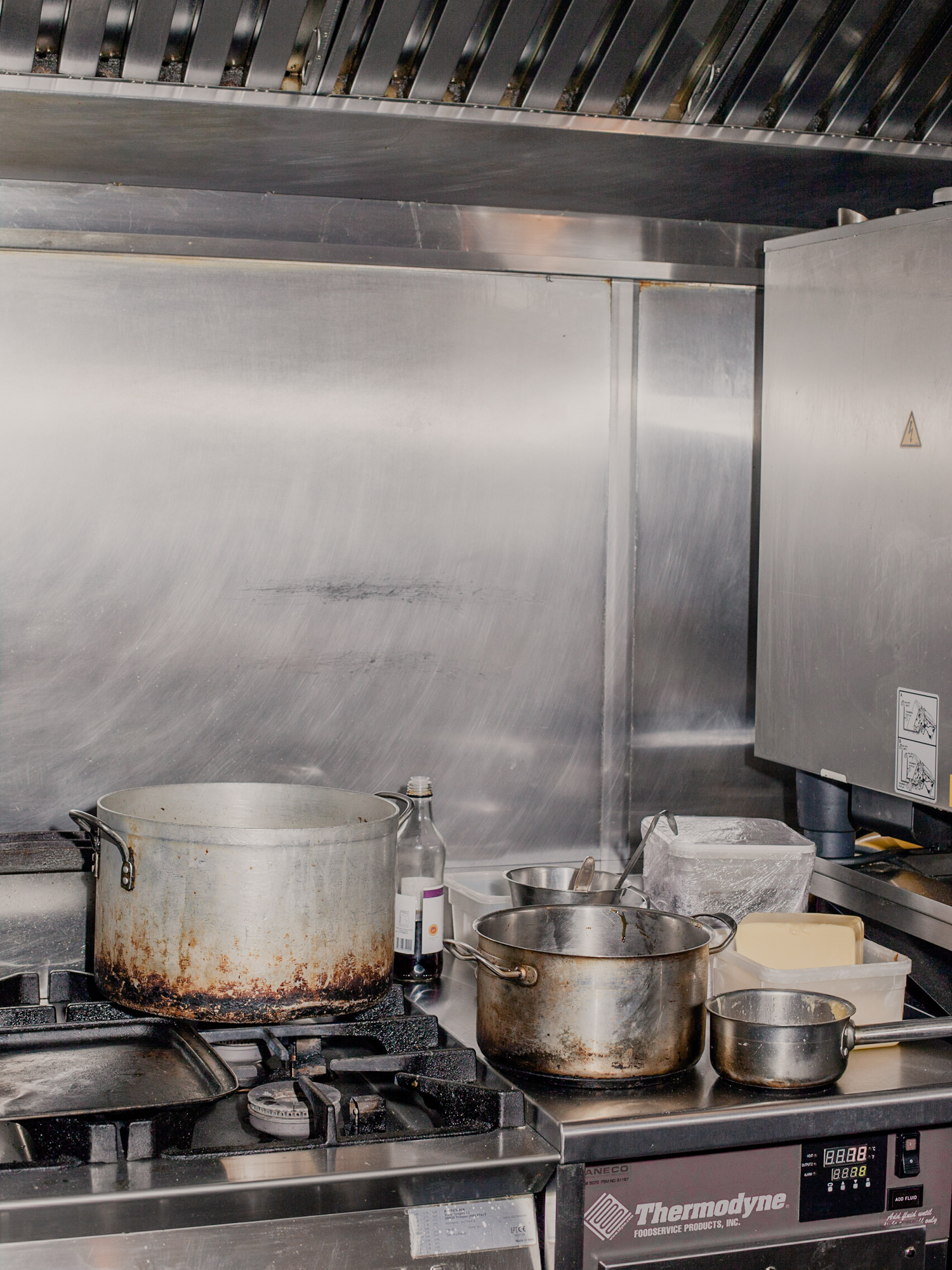
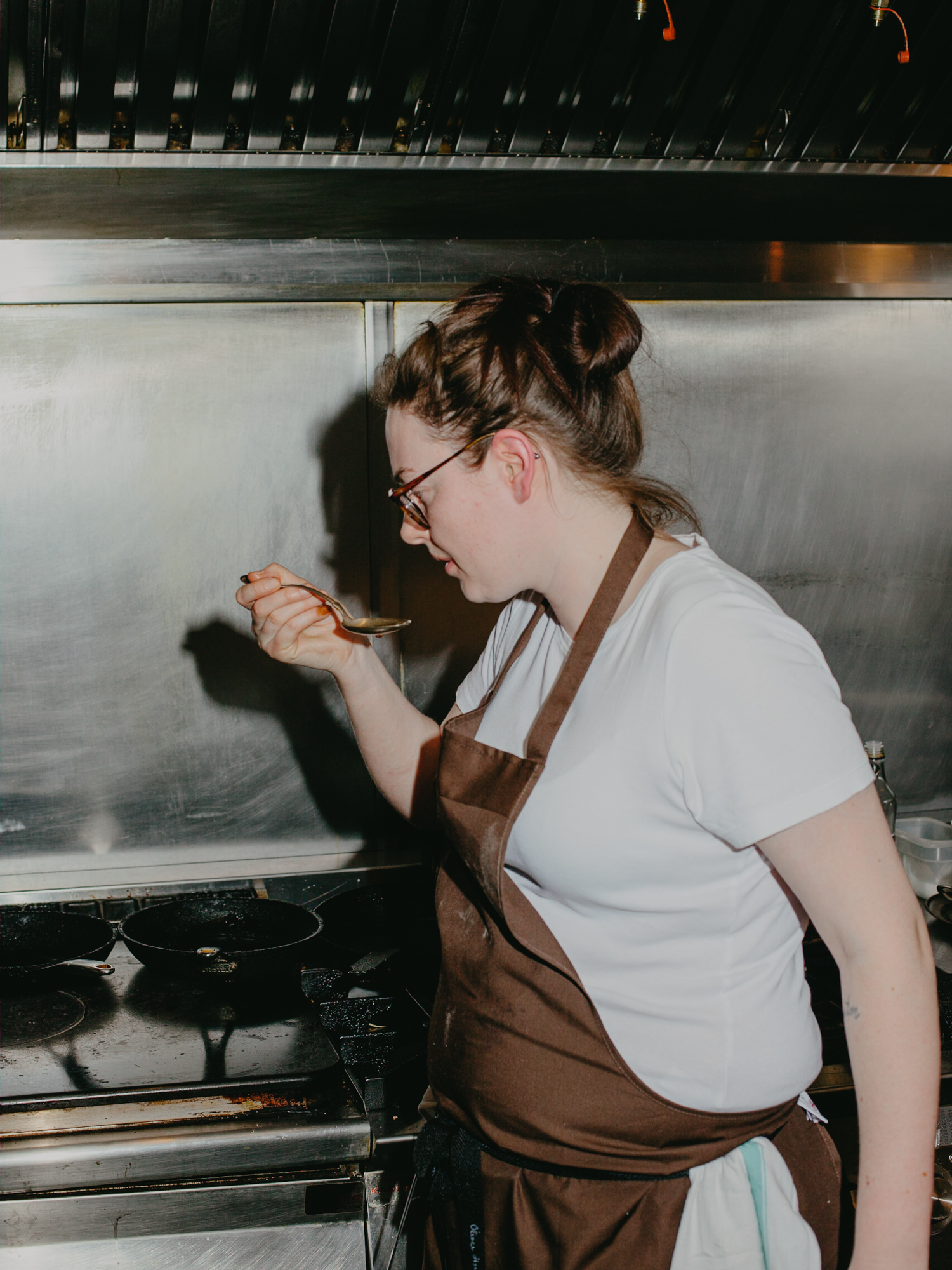
Isobel and Michelle have been together for the past year and a half. Although they both went to DIT at the same time, on different courses, their path didn’t properly cross until 2017. Michelle accuses Isobel of Instagram-stalking her, “she kept liking all my posts”. Isobel protests that there were approaches from Michelle’s side too. We finally agree that it was a two-way
stalk. After chatting online they had their first date in Etto.
Their cooking histories are very different. Michelle has just left Two Pups, a casually trendy coffee and grub spot on Francis Street, and before that she was in Rathgar’s Fia. Isobel is a sous chef in Forest & Marcy, the more casual but still high-end sister restaurant to John and Sandy Wyer’s Forest Avenue. She saw herself more as a baker until an eye-opening placement in Chapter One. She said she was clueless about cooking at that level which in ways was an advantage.
Isobel also worked for Neven Maguire, who she says really is as nice as he seems. She’s mad about her experience in Forest and Marcy, a spot that always comes up when I ask Dublin based chefs where they like to eat. She says working with head chef Ciaran Sweeney is a dream. “Without a doubt, he’s one of the best chefs I’ve ever worked with. He has a way with flavours like no other chef I’ve worked with.
He’s improved my palate and I’m only there eight months”. Michelle was head chef in Farmhill in Goatstown for while so she also has plenty of experience but generally more casual than her pop up partener. “Isobel is more of a fine dining kind of chef. I have a little bit experience but it’s not my passion. I just go in with things. If I never made myself out to be anything more than a cook really”. “Sure so am I,” says Isobel.
They both share this down to earth approach to food, but it manifests in different ways. Isobel is more into the fine-dining side of cooking, with the emphasis on craft, precision and discipline. She says, “I like the structure, the organisation. Even just having to get things done at a certain time”. Michelle says, “I wouldn’t have the discipline to be doing what Isobel does. I just don’t take it as seriously. I cook because I enjoy it. If I started to take it that seriously and got stressed out about it, I wouldn’t enjoy it. I wouldn’t be able to do it”. The pressure of a high-end kitchen is on another level, “I’m too craic-oriented.”
Saying that, Michelle clearly likes the creative side of cooking. The concept for the pop up was her’s.
“I’m good with the ideas, Isobel is good at executing things”.
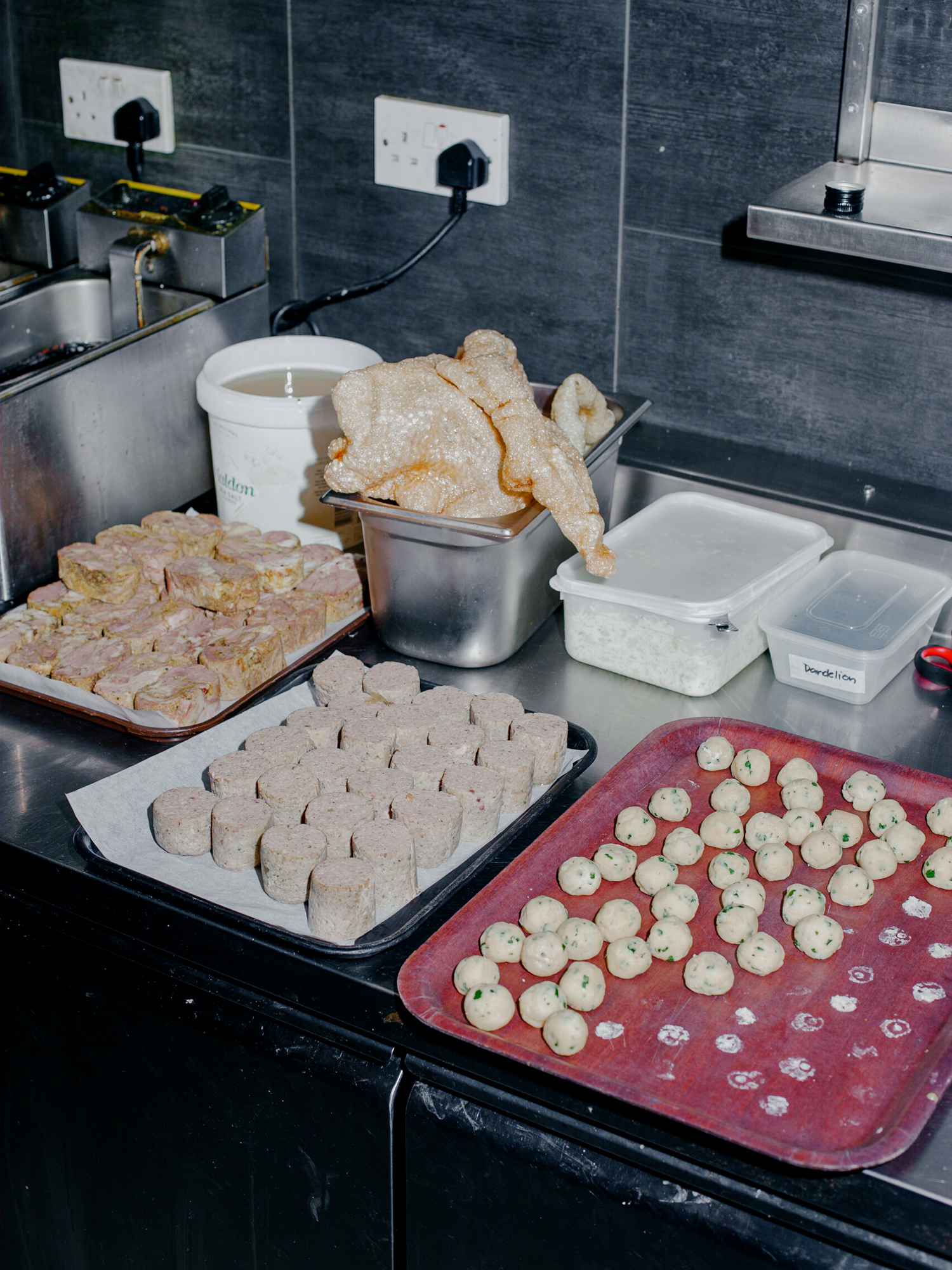
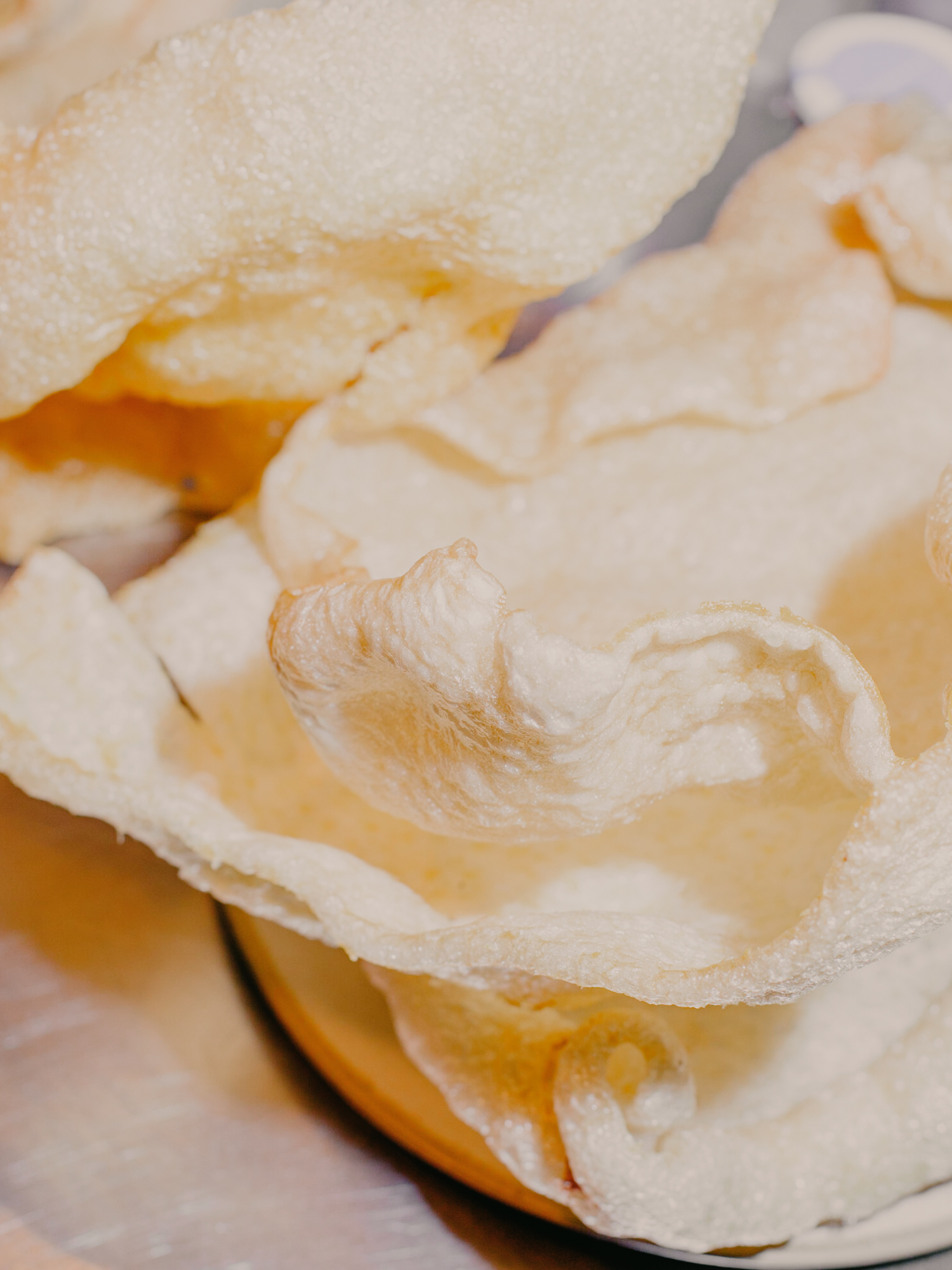
Michelle’s cousin Sonia Wickham did the haunting artwork for the event, and she hopes to get kept on board for future functions. Both Isobel and Michelle had grannies who fostered a love of food, including offal.
Michelle says, “we based it [the pop up] on stuff that people don’t really eat anymore. We love eating that kind of food, and you just don’t find that kind of food on menus in Dublin anymore”. Fergus Henderson’s nose to tail eating is an obvious reference point. Isobel says they read Henderson’s
books as inspiration and went to his London restaurant, St John’s.
“We wanted to cook stuff you don’t see anymore,” Isobel tells me. “Like the white pudding, you see plenty of black pudding. White pudding it’s gorgeous.”
Michelle agrees, “With the brown sauce, it’s very Irish. Other things we made were nostalgic, like the suet dumpling and oxtail broth.”
But she says mostly “it was about trying to get as much flavour into things
as possible”.
They were planning and preparing for weeks, searching for ingredients like the goat’s hearts from Broughgammon farm and the dandelion flowers from Dave Heffernan. Some of the preparations took days, like
the bone broth and some of the sauces.
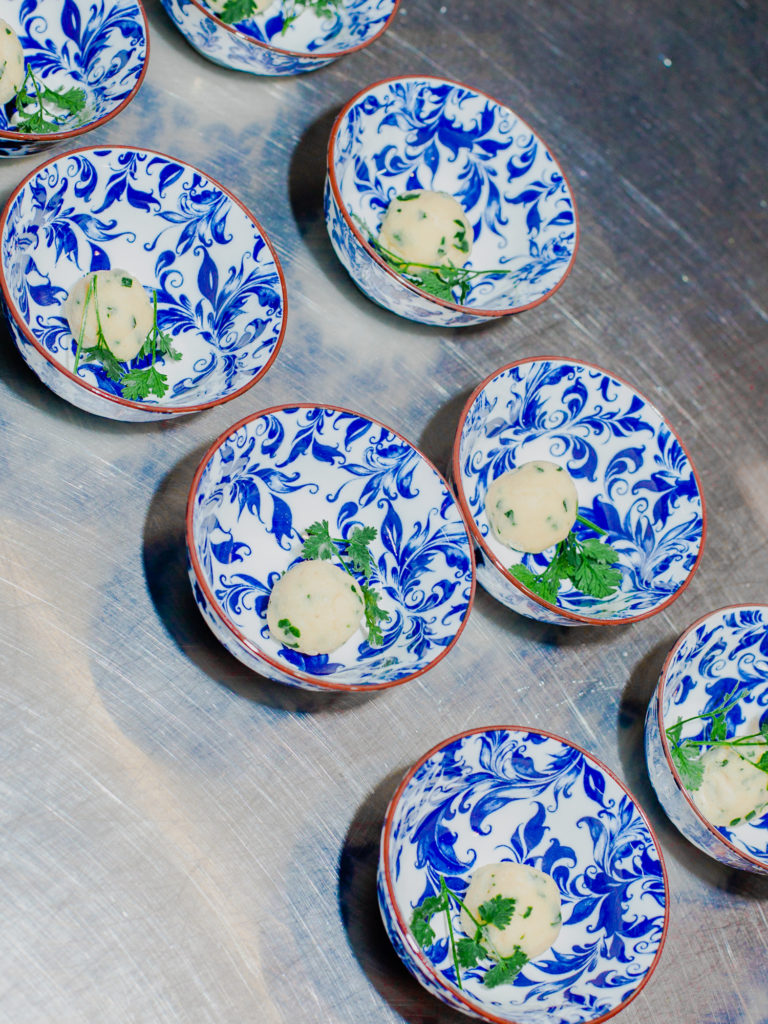
The pigs’ ears were slow cooked overnight, sous vide style. Despite the preparation it was the first time either of the chefs had taken on something like this. Michelle said it was “the first time I ever saw Isobel stressed. We weren’t stressed when people were there, it was fine. Just the hour before…
it was like oh god, oh god”.
The pigs’ ears were slow cooked overnight, sous vide style. Despite the preparation it was the first time either of the chefs had taken on something like this. Michelle said it was “the first time I ever saw Isobel stressed. We weren’t stressed when people were there, it was fine. Just the hour before…
it was like oh god, oh god”.
Michelle and Isobel are both a bit despondent about Dublin at the moment. Michelle sees a bit of a shift in terms of opportunities for setting up businesses,
“during the recession that’s when all the little independent places started popping up and now they’re just getting pushed out. There are cranes everywhere. It makes me feel overwhelmed. It’s taking the poverty and putting it under a carpet.”
Isobel compares Dublin to her two-and-a-half year stint cooking in San Francisco. She saw the tech-driven transformation of the city as it served the workers of Silicon Valley. Rents became unaffordable, “all the chefs were leaving. Before that it had lots of hippies, an artists community. Nine of ten years ago it was affordable. That all changed”.
Dublin’s globalised tech-hub status has an effect on our food culture, in good and bad ways. As a small country we’re also very susceptible to importing consumer fads. Michelle doesn’t mince her words when it comes to one obvious example: brunch.
I hate it. It’s all the same, it’s all a replica. I just want normal food. Like that place Canal Bank Café down on Leeson St. It’s just normal bread, not sourdough, and they do omelettes. It’s lovely
Michelle Wickham
“I hate it. It’s all the same, it’s all a replica. I just want normal food. Like that place Canal Bank Café down on Leeson St. It’s just normal bread, not sourdough, and they do omelettes. It’s lovely”.
Unsurprisingly they are resolutely against affectation, preferring simple quality over badly done sophistication. Take that bread we all love, sourdough. Isobel says “the majority of sourdough you get in Dublin is not great”. Michelle is more blunt, “it’s shite”.
We get Michelle to admit that people like brunch however, she adds, “I’m just not interested in cooking it anymore. There’s only so many eggs you can fry before you start to crack up”. Finally, a decent pun.
We talk about how spoilt we are with amazing natural products in Ireland, such as dairy. Isobel agrees “we are spoilt with our dairy, I don’t think we realise how good it is”. Then we get on to every chef’s bugbear: insincere food intolerances.
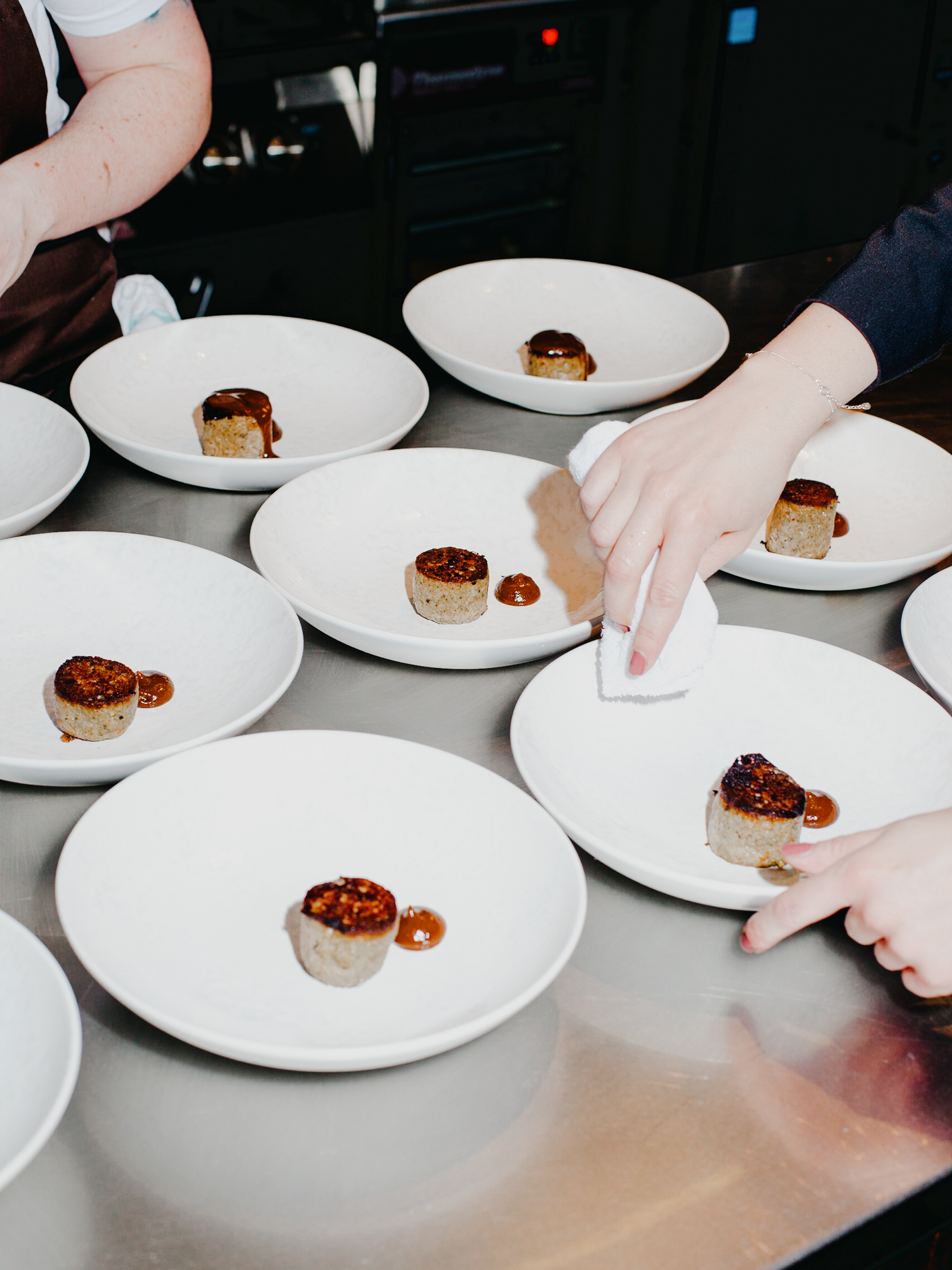
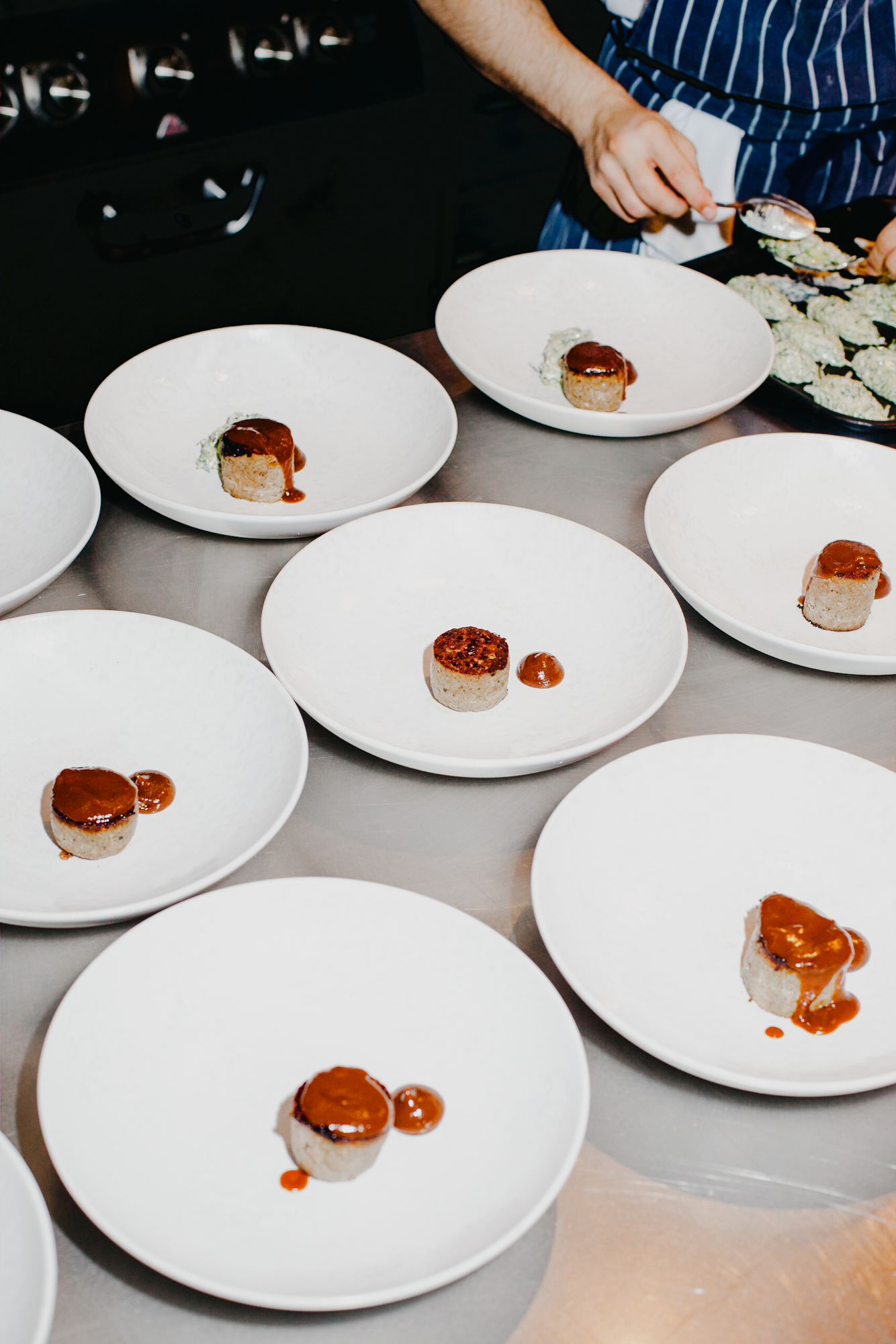
I’m just not interested in cooking it anymore. There’s only so many eggs you can fry before you start to crack up
Michelle Wickham
Both of them have seen a huge spike in people not eating certain foods in recent years. “Everybody has something these days,” remarks Isobel. “I can’t get over it. There’s too much information. People are self-diagnosing themselves”. Michelle is even more direct, “people just have issues, and they project it through food”.
They have sympathy for coeliacs and those with genuine allergy and intolerance sufferers but see some customers causing a lot of extra work for kitchens with no real medical reason. Michelle says, “you go to the trouble of making a new menu for a coeliac and then you see them drinking pints”.
“Or someone with a lactose allergy, scoffing away on the butter,” adds Isobel, “after us preparing sauces without any butter…”. She finds it curious that the weekday customers rarely have any food issues, “it’s much more noticeable in the restaurant at weekends. During the week its fine, the people who come out during the week just want to enjoy a good meal”.
Michelle thinks you can even draw distinctions based on postcodes, “when I worked in Fia in Dublin 6, I swear to God everyone had something wrong with them. I was like you shouldn’t even be eating out, you should be at home wrapped up in cotton wool. But down on Francis Street, in Two Pups, we hardly ever get an allergy… and if someone did have an allergy nobody
ever made a big deal about it”.
Regardless of allergy-ridden customers Michelle and Isobel are looking forward to the next iteration of Na Séasúir. Michelle thinks they might host it on the coast, in Cullenstown in Wicklow where she’s from. Isobel’s hours are bit more intense so I get the sense she’d be happy to wait a little while, but August is a possibility. Again the focus would be on less-commonly eaten food, this time from the sea. Michelle says, “I’d like to do some
seafood that’s not very normally used. We have oysters, cockles, beautiful seafood, it’s a foragers paradise. I’d just do five small plates, a surprise menu”.
Wexford strawberries would make an appearance, as they’re in season. Sustainability would be key. Michelle finishes, “There’s a cockle strand I’d just go down with a spade and a bucket and I’d dig them up, on Blackhall strand. I could get seaweed, sea lettuce. It’d all be sustainable. We could go down to the oyster farmer and get some oysters, go down to Hook head and get some potatoes, cook them in seaweed. There’s just so much good shit there that’s not being utilised down there at all”
This article was first published in the summer 2019 issue of Char.

